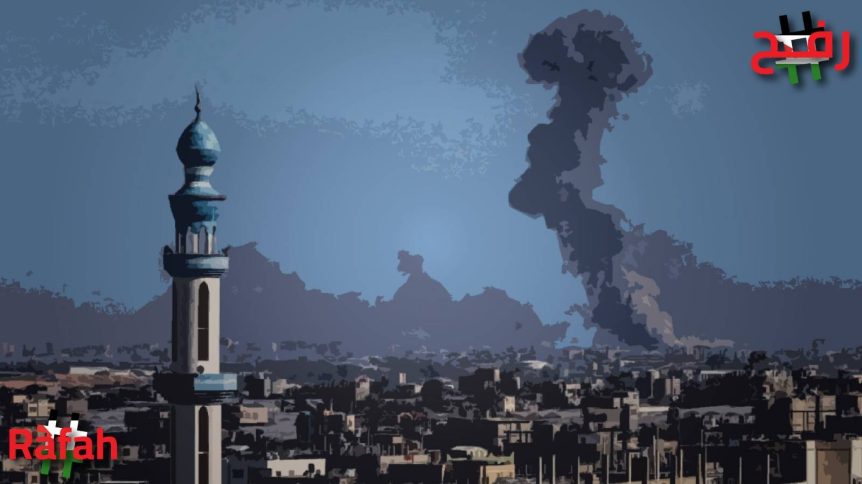Israel’s military operation in Rafah, launched yesterday 12 February, has led to a new bloodbath with over 100 people killed, according to media reports. An immediate and unconditional ceasefire must be secured in Gaza before any large-scale Israeli military assault on Rafah to avoid further civilian casualties the Cairo Institute for Human Rights Studies (CIHRS) says. This should be accompanied by the liberation of all civilian hostages. CIHRS reminds the international community of its obligation to prevent genocide and protect the Palestinian people from more indiscriminate attacks and forced displacement, by supporting a ceasefire and halting all support to Israel’s war effort, including arms exports.
“A military operation on an overcrowded area that was previously designated as a safe zone and where more than a million people are amassed in horrendous conditions is treacherous and is another sign of Israel’s contempt for Palestinian lives. This decision coming at a time where the International Court of Justice had ordered provisional measures on Israel to prevent genocide demonstrates Israel’s blatant disregard for international law and the impunity it enjoys,” said Amna Guellali, Research Director at Cairo Institute for Human Rights Studies.
On 9 February 2024, Israeli Prime Minister Benjamin Netanyahu ordered the Israeli Defense Forces and the security establishment to submit a plan to the cabinet for the evacuation of Rafah ahead of a ground assault, stating that Hamas battalions in Rafah must be destroyed to achieve the “goal of the war to eliminate Hamas”. No information was provided, however, about where people would be evacuated to; and while Netanyahu claimed that “safe passage for civilians” would be provided, he failed to elaborate on that process. Israel has given Palestinians in Gaza multiple ultimatums to relocate from North to South, to then attack those same places it declared safe, prompting the United Nations Secretary-General to state that “nowhere is safe in Gaza”. On 12 February, Israel launched a series of airstrikes and sea attacks on Rafah, as part of a mission to rescue two Israeli-Argentinian hostages. At least 100 people have been killed so far by Israeli airstrikes in its military assault on Rafah.
“In the past four months, Israel has killed tens of thousands of Palestinians and displaced them multiple times, destroyed their homes and cities, eliminated the conditions for future life on their lands and erased many traces of their civilization by targeting universities, places of worship and cultural sites,” added Guellali.
Rafah, Gaza’s southernmost region, houses approximately 1.5 million displaced Palestinians who had fled to the region after Israel declared it a “safe zone”. On 12 October 2023, Israel warned approximately 1.1 million Palestinians in North Gaza to relocate to the South within the next 24 hours, only to attack some of the civilians who heeded the warning on their way south. UN experts condemned the evacuation order as an act of forcible population transfer constituting “a crime against humanity” and “a blatant violation of international humanitarian law”.
On 24 January 2024, the International Court of Justice ordered six provisional measures in a case brought forward by South Africa alleging that Israel is violating the Genocide Convention. The Court found that there is a plausible case of genocide and ordered Israel to refrain from acts prohibited by the Genocide Convention, prevent and punish direct and public incitement to genocide, and take “immediate and effective measures” to ensure the provision of humanitarian assistance to civilians in Gaza.
Since 7 October 2023, Israel has been directing indiscriminate and disproportionate attacks against the civilian population in Gaza. Over 28,340 Palestinians have been killed, including at least 12,300 children, and 67,984 have been injured between 7 October 2023 and 12 February 2024. The hostilities have continuously worsened the humanitarian situation, leading to acute shortages of shelter, clean water, food, medicine, and healthcare. The UN has made multiple declarations on the situation in Gaza, calling it “a cemetery for children” and “the worst humanitarian catastrophe”’; with Rafah described as a “pressure cooker of despair”. Hundreds of thousands of displaced Palestinians in Rafah are sleeping in the open with inadequate clothing or shelter from the cold, the UN warned .
The international community must uphold its obligation to prevent genocide in Gaza and refrain from supporting Israel’s genocidal acts. On 12 February 2024, a Dutch court ordered the government to block all exports of F-35 fighter jet parts to Israel, on the grounds of a “real risk” of their use in the “commission of international law violations” in Gaza. The court’s decision, which can still be appealed, represents one of multiple state responses that uphold the obligation to prevent genocide, or at the very least, be absolved of complicity in its commission.
Share this Post

